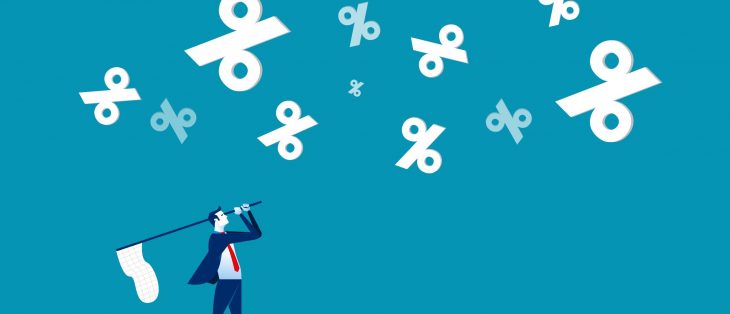What Happens When You Put Money In A Savings Account
How Does Savings Account Interest Work? Hither'due south Your Guide
Dislocated past the concept of interest? This video volition assist set the record straight.
Information technology may come up as no surprise that a savings business relationship is a good place to store your money. Savvy savers know that savings accounts tend to offering college interest rates than checking accounts. This means that with a savings account, you're earning more money with your money. Sign me up, right?
While a savings account sounds like a sweet deal, you may notwithstanding be wondering: How does savings business relationship interest work? Off-white question. It's one that puzzles many. Yet understanding how involvement works on a savings account is an important role of maximizing the earnings on your hard-earned, carefully stashed, cash.

We've got just the overview of how interest works on a savings account to get y'all started:
What is interest on a savings account?
At its simplest, interest is the price of borrowing money. Generally, you'll pay interest to borrow money, and yous can collect interest when you lend money.
Only who'south going to pay y'all to borrow your money? For many people, opening a savings account is one of the easiest ways to go about this. When you put money in a savings account, the bank is technically borrowing the money and paying you interest in return.
"The banking concern determines the rate, although it's affected past the general level of rates in the economy and whether the banking company is trying to attract new deposits," says Liz Weston, a certified fiscal planner and columnist at a personal finance website.

How does savings account interest work?
The involvement rate determines how much money a bank pays you to keep your funds on deposit. However, Michael Griffin, a certified public accountant and finance professor, says you should use the annual percent yield (APY) to compare savings accounts and other savings products.
"The simple way to expect at the APY—information technology's what you lot will get on your money," Griffin says. Meaning, you can apply the APY to decide how much you'll actually earn in interest each twelvemonth because the APY relies on two inputs: the interest rate and how oftentimes the interest compounds. Both are of import components of how involvement works on a savings account because they touch on how much money you'll earn over time. Your savings account interest could compound daily, monthly, quarterly or annually.
Suppose you deposit $v,000 into a savings business relationship, don't eolith or withdraw any more money and the involvement rate doesn't modify. If the business relationship has a 1.00% interest charge per unit and the interest compounds annually—that is, the bank pays you lot interest on your balance one time each year—you'll earn $50 afterward the first year. The APY will also be 1.00% in this instance because your interest didn't compound multiple times during the year.
If a bank offers a 1.00% involvement charge per unit on a savings account, the charge per unit of compounding could affect the APY and your earnings, although the differences may exist small-scale.
"With interest rates so low," Griffin says, "in that location is not a dramatic deviation in relative small balances in a savings business relationship considering of different compounding scenarios."
Nonetheless, your earnings can increase over time, especially when the savings account offers a college interest rate and APY, and you're regularly depositing money into your account.
Lucky for savers, many banks offer savings accounts with interest that compounds daily or monthly, rather than annually.

Where interest meets account fees and features
Understanding how interest works on a savings business relationship and comparing the APY offered at several banks are important steps in choosing where to open an business relationship.
Weston says yous tin oftentimes get better returns from an online savings account because online banks don't have to pay for branches and can pass the savings on to consumers. Online banks therefore "accept advantages over traditional banks," she says, "typically, no minimum business relationship residuum requirements or fees." For instance, a Find Online Savings Account comes with no account fees.1
Continue an eye out for fees, similar those for overdrafts or ATMs, when yous're comparing different savings business relationship options. These could offset your interest earnings or fifty-fifty cost you more than you earn. Other potential expenses include fees for bank checks or outgoing wire transfers.
Use a savings account for your financial goals
So, what is interest on a savings business relationship? Now that you lot've seen how interest works on a savings business relationship and know what to look for when comparing accounts, you lot can put your new knowledge to work. Whether y'all're saving for a new automobile, a vacation or edifice up your emergency fund, having a savings strategy can assistance you run into your goals.

Weston says without a minimum deposit requirement, you lot could utilise online savings accounts and "set up equally many accounts as you like and proper name them for unlike goals: vacation, holidays, holding taxes and so on." Separating your funds into different accounts earmarked for specific purposes can go far easier to resist temptations to spend randomly, which can ultimately help you achieve your financial goals sooner.
If you lot want to focus all of your efforts in one identify, some other option is to take 1 account where you go on all of your savings. You could then use a spreadsheet to categorize your funds by bills, expenses or financial goals.
These are just 2 examples. Have a different thought about how to organize your savings? Try it out. Every bit long as you're progressing toward your goals, and using your newfound understanding of how interest works on a savings account, you're headed in the right management.
Manufactures may contain information from tertiary-parties. The inclusion of such information does not imply an affiliation with the bank or bank sponsorship, endorsement, or verification regarding the third-party or information.
1Outgoing wire transfers are subject to a service accuse.
Source: https://www.discover.com/online-banking/banking-topics/how-interest-works-on-savings-accounts/
Posted by: huffmanancomp.blogspot.com

0 Response to "What Happens When You Put Money In A Savings Account"
Post a Comment